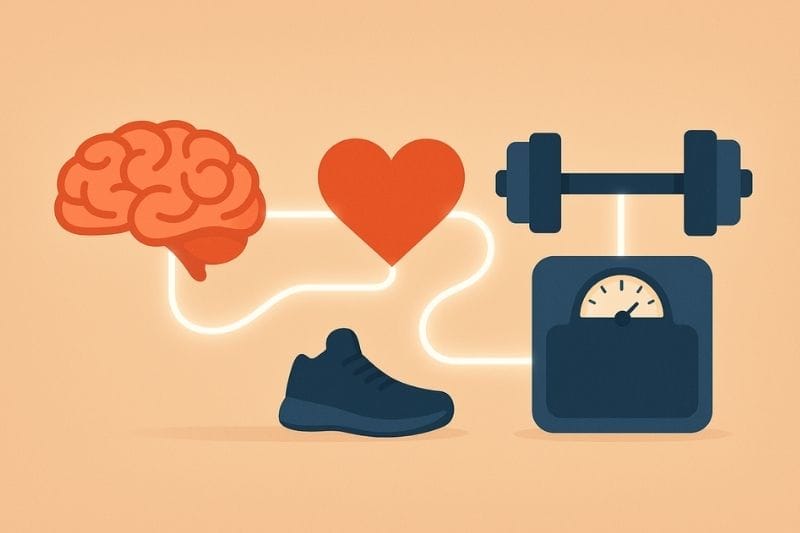Appraisal theory is a way of understanding how our thoughts shape our emotional reactions and behaviour. In simple terms, it is about how we interpret a situation and how that interpretation affects what we do next. Two people can go through the same event and have completely different emotional responses because they appraise it differently.
This is something I see all the time when I work with people on weight loss, fitness and stress. The situation itself is rarely the full story. How you make sense of it in your head is what often drives how you feel and act afterwards.
Where Appraisal Theory Comes From
Appraisal theory is a psychological framework that explains how our thoughts shape our emotional responses to different situations. It first emerged in the mid-twentieth century, when researchers started looking more closely at why two people can react in completely different ways to the same event.
The early foundations were laid by psychologist Magda Arnold in the 1950s. She suggested that emotions are not just automatic reactions but are influenced by how we appraise or interpret what is happening around us. A few decades later, psychologists such as Richard Lazarus developed the theory further. Lazarus focused on the idea that our appraisals come first, and emotions follow. In other words, the way you think about something affects how you feel about it, and then that shapes how you behave.
This framework is now widely used to understand not just emotional reactions but also how people deal with stress, motivation, confidence and decision-making. It plays a big role in health psychology, sports science and even sustainable weight management, because the way we interpret setbacks or challenges often influences our long-term behaviour.
Understanding Appraisal Theory in Everyday Life
The theory suggests that emotions are not just automatic reactions. They are created through the way we evaluate or appraise what is happening. For example, if you step on the scales and see the same number as last week, your emotional reaction depends on how you interpret that result.
One person might see it and think, “This is pointless, I am failing,” and feel angry or deflated. Another might think, “That is fine, I have had a tough week but I am still on track overall,” and move on without much drama. Same number. Two very different appraisals.
I often see this in client check ins. Two people can have almost identical weeks. One is frustrated, the other is calm and ready for the next step. It is not their weight that is different. It is the meaning they attach to it.
What Is Cognitive Appraisal Theory of Emotion
Cognitive appraisal theory is a branch of psychology that looks closely at how thoughts shape feelings. The basic idea is that emotions come from the way we evaluate situations, not the situations themselves.
Think about finishing a hard workout. One person might feel proud and motivated. Another might focus on how tough it was and feel discouraged. The workout is the same. The appraisals are different. Those appraisals then shape what happens next, whether someone keeps going or gives up.
How Appraisal Theory Affects Weight Loss
Weight loss is rarely a straight line. There are ups and downs, good weeks and challenging ones. How you interpret those moments matters.
For example, hitting a plateau is common. Some people see it as proof that nothing is working and give up. Others see it as part of the process and adjust their plan. The difference is not the plateau itself. It is the story they tell themselves about it.
I sometimes ask clients to feedback on the thoughts that come up when they weigh themselves or reflect on their week. You would be amazed at how many hidden appraisals sit underneath feelings of frustration or defeat. Once we bring those out into the open, we can work with them instead of letting them drive everything in the background.
How Appraisal Theory Affects Confidence
Confidence is not just about achievements. It is also about how you interpret what you do. If you miss a workout and immediately think, “I have messed everything up,” your confidence will drop. If you think, “That was one session, life happens, I will get the next one in,” it does not have the same impact.
I see this a lot when people start training after a long break. The early weeks are full of comparisons with their past self. Some beat themselves up for not being where they were before. Others see it as a new chapter and focus on small wins. The training is the same. The appraisals are different. The confidence that follows is too.
How Appraisal Theory Affects Fitness Motivation
Motivation often depends on how you appraise the effort and the rewards. If every setback is seen as catastrophic, motivation will drop fast. If setbacks are seen as part of the journey, you are more likely to keep going.
One of my clients once texted me after a tough session saying, “I was rubbish today.” When we unpacked it, what actually happened was that she was tired from work and her lifts were slightly off. Her appraisal turned a normal off day into a story about failure. Once we reframed it, her motivation bounced back quickly. To me, the fact she still got it done when tired was a WIN!
How Appraisal Theory Affects Work Stress and Food Choices
Work stress is a big trigger for a lot of people. The way you appraise stressful days can shape your behaviour around food.
I have had clients message me in the evening saying they are stressed and reaching for the biscuits. The stress is real, but the link between the day and the biscuits is often the appraisal. “I have had a terrible day so I deserve this” or “I cannot cope so I need this” are powerful thoughts. When people start spotting those patterns, they can find other ways to handle stress rather than going straight to food.
Are Some People More Prone to Certain Appraisals
Some people do seem more prone to unhelpful appraisals than others. This can be down to personality, past experiences, or how you have learned to interpret the world over time. If you grew up in an environment where mistakes were criticised harshly, you might be quicker to appraise setbacks negatively. If you have had repeated knockbacks, you might be more sensitive to anything that feels like failure.
There is also a thinking style element here. Some people naturally question their thoughts and spot patterns quickly. Others take their thoughts at face value and react to them without realising there is another way to interpret things. Neither is right or wrong, but becoming aware of your own style can make a huge difference.
How to Use Appraisal Theory to Support Weight Loss and Fitness Goals
The key is not to try to control every thought but to get better at noticing your appraisals and how they shape your reactions. A few simple steps can help:
- Notice your automatic thoughts. When something happens, pause for a moment and see what story you are telling yourself about it.
- Question whether that story is accurate or helpful. Is there another way to see it.
- Practise reframing. You do not need to turn everything into a positive spin, but even a small shift can change how you feel and act.
- Over time, this gets easier. You start spotting the patterns before they take over.
Sometimes I encourage clients to keep a quick reflection journal, especially during challenging weeks. It does not have to be anything fancy. Just a few sentences about what happened and what they told themselves about it. It can be a real eye opener.
Using Pattern Interrupters to Change Automatic Reactions
Some people find that even with strategies like reflection journals and setting clear goals, old habits can still creep back in. This is often because many of our reactions happen automatically before we even have time to think about them. A pattern interrupter is a simple way to break that loop. It gives you a brief pause to notice what is happening and choose how to respond, rather than slipping straight into old patterns.
This does not need to be anything dramatic. In fact, the most effective interrupters are usually simple. For example, it might be taking a slow breath before you open the cupboard after a stressful day. It might be pausing before you step on the scales and asking yourself what story you are already telling yourself about the number. It might even be something as straightforward as changing your environment, such as moving to a different room.
The aim is to create a small gap between the situation, your appraisal, and your response. That space is often enough to shift the outcome. You might still make the same choice, but you have done so consciously rather than automatically. Over time, these small breaks in the pattern can have a big impact.
For weight loss and fitness, this can be especially powerful. A pattern interrupter can help you spot the moments where unhelpful appraisals take over, such as “I have blown it, so I might as well keep going,” or “I am too tired to exercise.” By interrupting those automatic thoughts, even briefly, you give yourself the chance to respond differently. That could mean choosing a smaller portion, going for a short walk instead of skipping activity altogether, or simply deciding to check in with how you actually feel before reacting.
Pattern interrupters are not about perfection. They are about building awareness and giving yourself more options in the moment. When you combine this with a better understanding of your appraisals, it can be a very effective tool for long-term change.
Frequently Asked Questions
What is the main idea of appraisal theory?
It is that emotions are shaped by how we interpret situations, not just by the situations themselves.
How does appraisal theory apply to weight loss?
It explains why two people can face the same setback and react completely differently. The difference is in their interpretation, not the event.
Can appraisal theory help with emotional eating?
Yes. By noticing the thoughts and interpretations that come before emotional eating, you can find other ways to respond.
Are some people naturally more negative in their appraisals?
Some people are more prone to unhelpful patterns, often because of past experiences or thinking styles, but these patterns can be changed.
Can you change your appraisals over time?
Yes. With awareness and practice, you can learn to reframe how you interpret situations, which can change your emotional responses and behaviour.
I can help you…
I am a Weight Loss Coach, successfully helping people just like you to lose weight and keep it off:
I am a Fitness, Strength and Nutrition Coach for sports events and athletes – helping people like you to get fitter, stronger and faster:
Want to get stronger, fitter or gain muscle?




